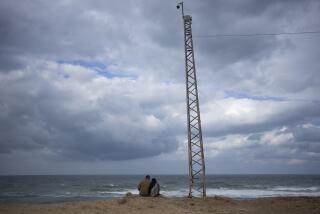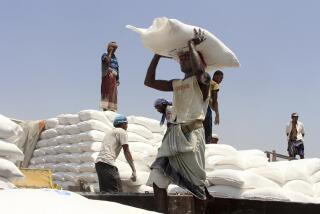PLO Slashes Spending to Cope With Funds Cutoff : Palestinians: Gulf states are angry over Arafat’s support for Iraq. The crisis threatens his leadership.
- Share via
TUNIS, Tunisia — Faced with a drop of more than 80% in funding after the Persian Gulf War, the Palestine Liberation Organization has been forced to close diplomatic missions, shut down propaganda newspapers, lay off workers and slash travel expenses, PLO Chairman Yasser Arafat said Friday.
Arafat, whose leadership is threatened by the financial crisis inside the organization, said the PLO’s annual revenue has dropped from $300 million to about $40 million, mainly because of funding cuts by Gulf states angered by the PLO chief’s stridently pro-Iraq position during the war.
So far, Arafat said, the PLO has not had to cut key social programs--such as aid to families of slain PLO fighters or its extensive educational and medical programs--that are considered key to maintaining the organization’s political strength in the Israeli-occupied West Bank and Gaza Strip.
But the strain of the economic pressures is obvious here at the PLO’s headquarters, where representatives are struggling to find new sources of funds and to repair links with Saudi Arabia and other Gulf nations.
“We still believe that all the Arab states will come back to the PLO,” said PLO economist Ahmed Kureah. “But if some prince doesn’t pay us, we will go to other friends and ask for money.”
Kureah, a former banker in Saudi Arabia who is Arafat’s chief economic adviser, said the PLO has sought to save money by closing more than 20 of its 92 diplomatic missions around the world, shutting down PLO newspapers and magazines, laying off employees and imposing travel restrictions, including a ban on expensive hotels.
Western specialists on the PLO here say that for an organization that operates as a government without a territory, tending to the scattering of thousands of Palestinian families throughout the Middle East, the huge funding loss has increased pressure on Arafat to step down as PLO leader.
Saudi Arabia and Kuwait have made it clear that they will not renew funding, including imposition of an old 5% PLO “withholding tax” on Palestinians living in their territories, unless the PLO changes its leadership. According to Kureah, the “liberation tax” has provided $62.5 million in annual revenue, including $37.5 million from Kuwait, one of the world’s richest countries per capita before Iraq invaded last August.
Direct funding from the Gulf countries exceeded $110 million, including $85 million from Saudi Arabia, before the Gulf crisis began.
“It could easily be seen that another leader would have a better chance of getting the contributions back,” said a Western diplomat in Tunis. Arafat irritated other Arab leaders, particularly in the Gulf and Egypt, by consistently pandering to Iraqi dictator Saddam Hussein, at one point ordering PLO troops to fight alongside the Iraqis.
Arafat himself appears particularly sensitive about the question of stepping down. A reporter who interviewed the PLO leader Friday was advised by one of Arafat’s aides not to ask the chairman about resigning. He said Arafat is upset over the fact that nearly every reporter visiting his Tunis office begins by asking the same question.
“If you start out that way, it will kill the interview,” warned the aide, Khaled Salem.
Despite the pressures, Arafat clings gamely to the job he has held for more than 30 years, insisting that as the elected leader of the PLO--technically, the chairman of its executive committee--he does not have the right to leave the organization.
Wrestling with the funding problems has become a “night-and-day” preoccupation, Arafat said in the interview.
“You don’t know how I am suffering to carry on paying for this social affairs,” Arafat said in English. He was still seated at his desk before a stack of bills, letters and financial documents in one of his Tunis offices at 2 a.m. Friday.
The Palestinian leader said the cutbacks have been in all sectors of PLO operations except for the social programs in the occupied territories.
“Concerning our societies, our schools, our hospitals,” he said, “we are trying to cover it from different sources.”
According to Kureah, PLO social programs in the West Bank and Gaza Strip include monthly payments totaling $6 million to an estimated 90,000 “families of martyrs.” The PLO also makes payments to the families of those Palestinians considered political prisoners, primarily in Israel.
Under the program, the organization also pays for the education of children, including their university tuition and expenses. He noted proudly that five Palestinians are enrolled at Harvard University on PLO scholarships. But he said the PLO is “starting to reconsider--maybe we should cut back on expensive schools like Harvard.”
Kureah said the PLO spends about $12 million on hospitals in Jordan, Egypt, Lebanon and the occupied territories run by the Palestine Red Crescent Society, the PLO equivalent of the Red Cross. Another $18 million, he said, is spent on five Palestinian universities in the occupied territories. Before the war, he said, this program was entirely funded by the Kuwaiti government.
The PLO must also pay the salaries of the 23,000 government employees in the occupied territories, a responsibility it inherited from the Jordanian government, which used to administer the territories before King Hussein gave up his interests there in favor of the PLO.
The PLO commitment to just these programs is more than $132 million annually, according to figures supplied by Kureah. It does not include the administration and staff costs of the PLO organization itself, including the travel bills for the peripatetic Arafat, and the estimated $100 million paid annually to the Palestine Liberation Army, a uniformed military force. Obviously, the PLO expenses far exceed its revenue.
“I think they are reeling,” said a Western diplomat who said he has received complaints from local luxury hotels that PLO bills were months overdue.
According to many experts on the PLO, the importance of money spent on social services by the PLO cannot be overemphasized. Although most of the international attention on the organization focuses on its 42-year quest for a homeland, it is the social program that builds fidelity among the Palestinian people in the occupied territories and refugee camps.
More to Read
Sign up for Essential California
The most important California stories and recommendations in your inbox every morning.
You may occasionally receive promotional content from the Los Angeles Times.













